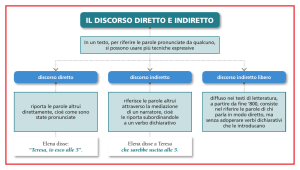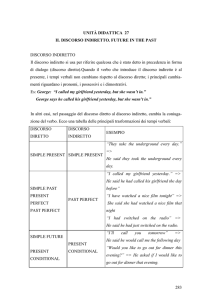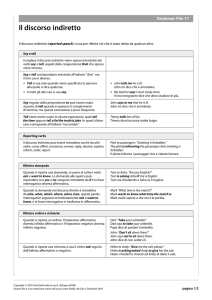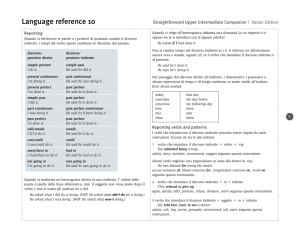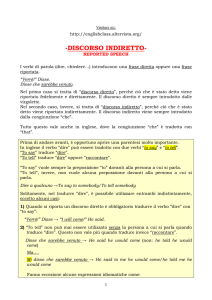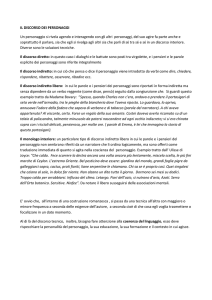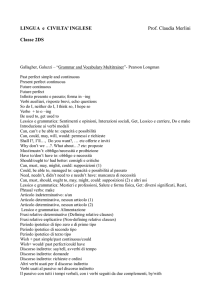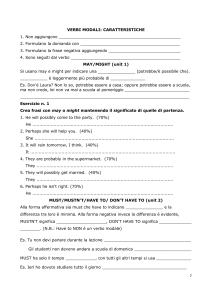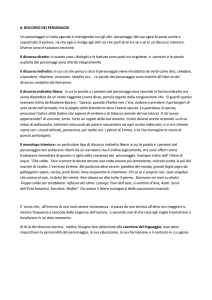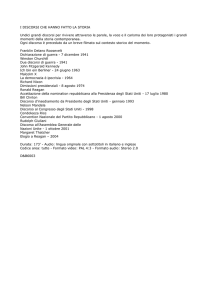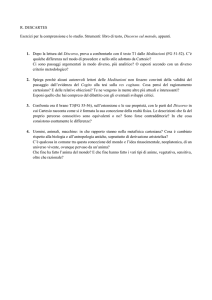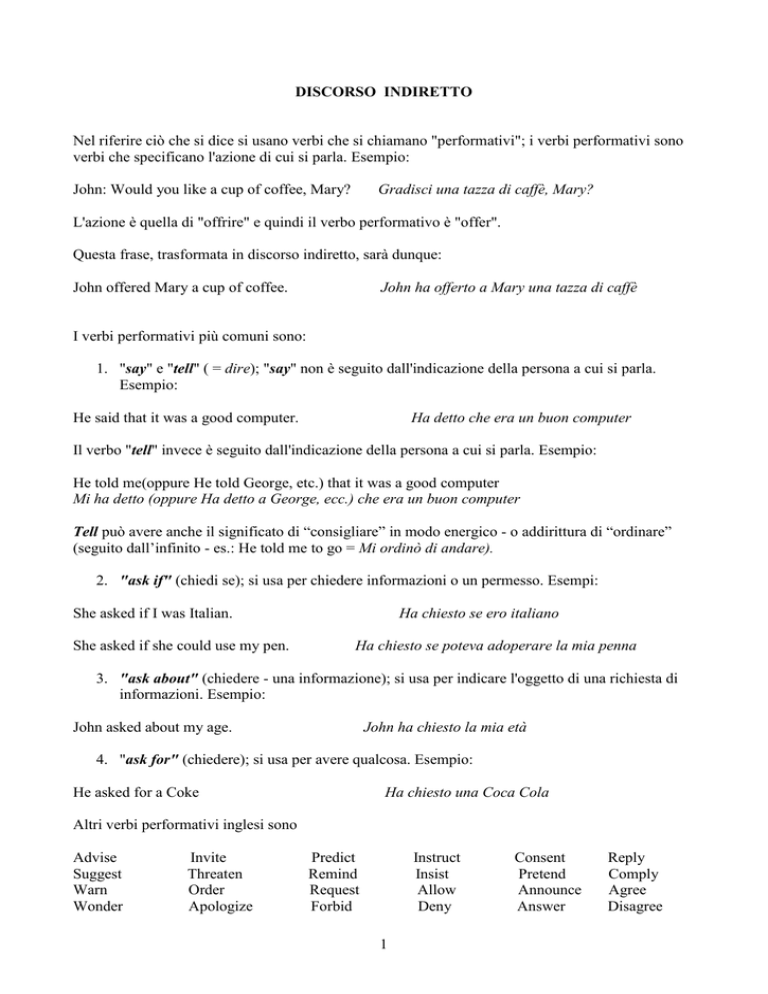
DISCORSO INDIRETTO
Nel riferire ciò che si dice si usano verbi che si chiamano "performativi"; i verbi performativi sono
verbi che specificano l'azione di cui si parla. Esempio:
John: Would you like a cup of coffee, Mary?
Gradisci una tazza di caffè, Mary?
L'azione è quella di "offrire" e quindi il verbo performativo è "offer".
Questa frase, trasformata in discorso indiretto, sarà dunque:
John offered Mary a cup of coffee.
John ha offerto a Mary una tazza di caffè
I verbi performativi più comuni sono:
1. "say" e "tell" ( = dire); "say" non è seguito dall'indicazione della persona a cui si parla.
Esempio:
He said that it was a good computer.
Ha detto che era un buon computer
Il verbo "tell" invece è seguito dall'indicazione della persona a cui si parla. Esempio:
He told me(oppure He told George, etc.) that it was a good computer
Mi ha detto (oppure Ha detto a George, ecc.) che era un buon computer
Tell può avere anche il significato di “consigliare” in modo energico - o addirittura di “ordinare”
(seguito dall’infinito - es.: He told me to go = Mi ordinò di andare).
2. "ask if" (chiedi se); si usa per chiedere informazioni o un permesso. Esempi:
She asked if I was Italian.
She asked if she could use my pen.
Ha chiesto se ero italiano
Ha chiesto se poteva adoperare la mia penna
3. "ask about" (chiedere - una informazione); si usa per indicare l'oggetto di una richiesta di
informazioni. Esempio:
John asked about my age.
John ha chiesto la mia età
4. "ask for" (chiedere); si usa per avere qualcosa. Esempio:
He asked for a Coke
Ha chiesto una Coca Cola
Altri verbi performativi inglesi sono
Advise
Suggest
Warn
Wonder
Invite
Threaten
Order
Apologize
Predict
Remind
Request
Forbid
Instruct
Insist
Allow
Deny
1
Consent
Pretend
Announce
Answer
Reply
Comply
Agree
Disagree
La scelta corretta del verbo performativo da usare nel discorso indiretto dipende dalla funzione
comunicativa espressa nella frase al discorso diretto.
Esempi:
“I think you should do it”
“Don’t cross the road”
He advised us to do it/He suggested that we (should) do it
He warned me not to cross the road
(ma potrebbe essere anche: He told me not to cross the road)
“You mustn’t marry him!”
He forbade her to marry him
“What does he mean by this?”
He wondered what he meant by that
“I’m sorry I’m late”
He apologized for being late
“Do that again and I’ll kill you!”
He threatened to kill me if I did that again
“Don’t forget to lock the door”
She reminded me to lock the door
“Push the red button first”
He instructed me to push the red button first
“Would you like to come with me?” She invited me to go with her
“Have a piece of cake”
She offered me a piece of cake
“I really want to buy it”
He insisted on buying it,
etc.
Il passaggio dal discorso diretto al discorso indiretto può comportare la modifica di alcuni elementi
della frase:
1. PRONOMI PERSONALI. Esempio:
“I don't want it”.
“Non lo voglio”
Può diventare, a seconda dei casi nel discorso indiretto:
He says that he doesn’t want it
Dice che non lo vuole
(se la trasposizione riguarda il presente), oppure:
He said that he didn’t want it.
Disse che non lo voleva
(se la trasposizione richiede un “salto” di tempo dal presente al passato).
Nota che in entrambi i casi nella trasposizione “I” è diventato “He”.
2. AUSILIARI. Nell'esempio precedente “don't” è diventato “doesn't” e “didn’t”
3. POSSESSIVI. Esempio:
She was my teacher
Era la mia insegnante
diventa
He said that she was his teacher
Ha detto che era la sua insegnante
(Nota che “my” è diventato “his”).
Il passaggio al discorso indiretto implica spesso un cambiamento del tempo dei verbi. Osserva
questi esempi.
2
DISCORSO DIRETTO
DISCORSO INDIRETTO
“She is in London”.
He said that she was in London.
“I'm doing my homework”.
He said that he was doing his homework.
“I have already done it”.
He said he had already done it.
“She can do it”.
He said she could do it.
“I will do it”.
He said he would do it.
Passando al discorso indiretto, la forma interrogativa diventa indiretta. Esempio:
“Where are they?”
He asked where they were
Nel discorso indiretto il riferimento al tempo e alla collocazione può essere fatto in modo diverso.
Esempi:
“I'm leaving tomorrow”
He said he was leaving the following day
“Put it there”
He asked me to put it on the desk
3

